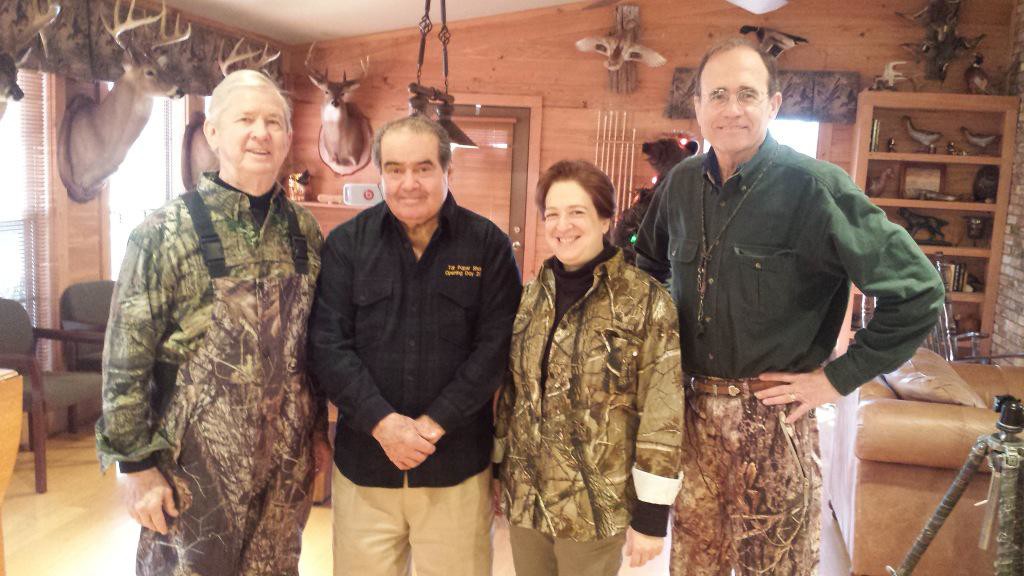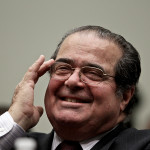Over the course of our nation’s history, many jurists have been described as “towering figures in the law.” Antonin Scalia had the distinction of being one of the handful for whom the description is actually justified.
Justice Scalia preached the principle that the Constitution should be interpreted in a way that honors the text—the words on the page—understood as it was by those whose ratification made it part of the fundamental law of the land. One might have thought this was simple common sense. But the principle had been ignored or abandoned by jurists and law professors who sought to expand the authority of judges to invalidate as “unconstitutional” legislation or executive actions that they happen to regard as unfair, unwise, or for some other reason undesirable.
In our own time, this impulse has been mainly evident among political progressives. It is what has given us court-ordered legal abortion in Roe v. Wade and judicially mandated recognition of same-sex partnerships as legal marriages in Obergefell v. Hodges. Earlier in our national history, it drove the jurisprudence of laissez-faire economic conservatives, generating such decisions as Lochner v. New York, a 1905 ruling that struck down a worker protection statute limiting the number of hours employees could be required or permitted to work in industrial bakeries.
For Scalia, judges who yield to the impulse to read into the Constitution “rights” or other principles, nowhere to be found in the text of the document or the logical implications or original understanding of its provisions, betray the rule of law and make a mockery of their oath of fidelity to the Constitution. To “Lochnerize,” as it has come to be known, whether in the cause of laissez-faire economics (as in Lochner itself) or liberal social ethics (as in Roe and Obergefell), is to deprive the American people of the right to govern themselves. For judges, on the pretext of enforcing constitutional guarantees, to substitute their own moral and political judgments for the contrary judgments of the elected representatives of the people is an assault upon the very Constitution in whose name they purport to be acting.
Start your day with Public Discourse
Sign up and get our daily essays sent straight to your inbox.Since various “theories” of constitutional interpretation (“living constitutionalism,” “the moral reading of the Constitution”) have been advanced by jurists and legal scholars in efforts to justify the judicial usurpation of democratic legislative authority, it became necessary for Scalia and other defenders of the idea that the Constitution means what it says—i.e., what the people who framed and ratified its provisions meant by the words they used—to give a name to their “theory” of constitutional interpretation. The name they chose was “originalism”—marking the conviction that the original public understanding of constitutional provisions and principles should guide and govern judges in determining whether a law or policy ought to be upheld as constitutionally valid or declared unconstitutional.
Not only was Nino Scalia an “originalist”—the leading originalist of his time—he was also a defender of the equal authority and responsibility of the three branches of government in matters of constitutional interpretation, a view that when fleshed out is known as “departmentalism.” In other words, he sided with Abraham Lincoln and against Lincoln’s nemesis, Supreme Court Chief Justice Roger Brooke Taney, on the question of whether the legislative and executive branches must always conform their conduct to the Supreme Court’s interpretation of the Constitution. Taney said yes. Lincoln said no. The question arose whether Lincoln as president would consider himself bound by Taney’s pro-slavery ruling in Dred Scott v. Sandford (striking down congressional restrictions on slavery in U.S. territories, and holding that blacks—even free blacks—could never be citizens). In the Great Emancipator’s First Inaugural Address, he answered that for the American people to treat the judiciary as supreme in constitutional interpretation would be for them to “have ceased to be their own rulers, having, to that extent, practically resigned their government into the hands of that eminent tribunal.”
For much of the 20th century, however, judicial supremacy—Taney’s old idea that what the judges say goes, no matter what; that the Supreme Court when it hands down a ruling is supreme not only over the inferior federal courts, but over the coordinate branches of government—was a kind of orthodoxy among law professors, lawyers, and judges. To question it—to embrace Lincoln’s position—came to seem scandalous. But Antonin Scalia not only questioned but rejected it. And he rejected it for the best possible reasons—Lincoln’s reasons—because it is incompatible with the republican principles of the Constitution itself. For Scalia, as for Lincoln, the rule of law was not the rule of judges; and a decision of the Supreme Court was the law of the case (binding on the parties) but not necessarily the law of the land (binding on the other branches of government).
In a public conversation with me at the Union League in Philadelphia last year, Scalia said that although it is generally advisable for the president and Congress to accept a constitutional ruling of the Court, even if they regard it as erroneous, it is not always the proper course; and it is certainly not the proper course where a Court ruling constitutes a gross usurpation of legislative authority—a judicial power grab. When asked for examples, he cited Dred Scott v. Sandford, Lochner v. New York, and Roe v. Wade—cases in which a majority of Supreme Court justices, blatantly legislating from the bench, invented rights found nowhere in the Constitution in an effort to impose on the nation the justices’ preferred policy position on morally charged issues of great public moment.
As a jurist, Antonin Scalia was known for his tough questioning of lawyers appearing before the Court, and for his brilliant, colorful, often combative opinions—many of which took the form of dissents. In addition to his determined advocacy of originalism, he will be remembered for his devotion to the constitutional principle of the separation of powers and his efforts to restore federalism—despite his belief that the progressive-era constitutional amendment providing for the direct election of Senators made the task hopeless. (“Federalism is dead,” he told me and our audience at the Union League. “The Seventeenth Amendment killed it. It’s dead, dead, dead.”)
What was Nino Scalia like as a person? He was a man of limited patience and great compassion. To say that he “did not suffer fools gladly” would be an understatement. He had no tolerance for slouchers, slackers, rent-seekers, time-servers, or free riders, and he wouldn’t bend the law for anybody—even if he personally believed the law too harsh. But as his friends of all political persuasions unanimously attest, he was capable of great kindness and generosity. He was a limited-government man, both as a matter of political philosophy and constitutional law, but he deeply believed in personal responsibility, including the duty of charity to those who are suffering or in need.
A devout Catholic, Scalia neither hid nor flaunted his faith. When asked about his beliefs, he spoke of his Christian commitments with no hint of embarrassment. He was not ashamed of the Gospel. In a widely publicized speech, he reminded his fellow Christians of the teachings of St. Paul, urging them to “have the courage to have your wisdom be regarded as stupidity: Be fools for Christ.” In an interview with an unbelieving (and, truth be told, rather incredulous) reporter for New York Magazine, he avowed his belief in the existence of the Devil, noting that the father of lies has become “wilier” in the modern period, encouraging people not only to sin, but to disbelieve in both him and God.
Among those—including, alas, some in academia—still in the grip of the anti-Catholic bigotry that Arthur Schlesinger, Sr., described as “the most deeply held prejudice of the American people,” Scalia’s candor in speaking about his faith has given oxygen to a crank theory that Scalia’s originalism was, in reality, a kind of cover for the resolution of constitutional cases in ways that best comport with Catholic doctrine. Beyond having a hearty laugh at such malicious goofiness, the less said about it and the people who peddle it the better. Scalia himself dealt with it by noting that he was forbidden by a teaching of his faith from manipulating the Constitution, for any reason—including making the law conform to the teachings of his faith: “Thou shalt not lie.”
One of Antonin Scalia’s most remarkable qualities was his gift for friendship—a gift that enabled him to form deep and lasting bonds of affection despite religious, moral, or political differences. His closest friend on the Supreme Court was the stalwart liberal Ruth Bader Ginsburg (with whom he had also served on the U.S. Court of Appeals for the DC Circuit). He also befriended his younger, hipper liberal colleague, Elena Kagan, sometimes dragging her off with him on hunting trips. Justice Kagan’s staunch progressivism and firm rejection of originalism did not diminish his affection or respect for her in the slightest.

Sherif Girgis, a doctoral candidate in philosophy at Princeton and a law student at Yale (and my co-author along with Ryan T. Anderson of What is Marriage? Man and Woman: A Defense), has insightfully summed up Scalia’s special and quite remarkable appeal to law students and other young men and women who are interested in constitutional law:
In a field marked by intellectual jockeying, preening, and mutual comparison, Justice Scalia boldly professed things that many of his secular, liberal academic colleagues thought simpleminded and naïve—originalism, patriotism, faith in God. The brilliance and sheer joie de vivre that oozed from his writing and filled the room when he spoke made his ideals attractive to the young (often via the shadow law curriculum of his dissents), and challenged adversaries to engage him in intellectual combat.
Nino Scalia was a faithful and loving husband to Maureen, his brilliant, Radcliffe-educated wife of fifty-five years, and a wonderful father to their nine children.
Speaking personally, I am indebted to him for many kindnesses. When I was installed as McCormick Professor of Jurisprudence at Princeton, he was even happier about the honor that had come my way than I was. When I founded the James Madison Program in American Ideals and Institutions, he immediately asked what he could do to help in advancing its mission. He lectured at my invitation on numerous occasions at Princeton and elsewhere and was always willing to welcome groups of my students as his guests to attend oral arguments at the Court.
Nino was a dear friend and I shall miss him.
With the death of Antonin Gregory Scalia the nation has lost one of its greatest jurists and a man who embodied the principle of fidelity to the Constitution. Requiescat in pace.














